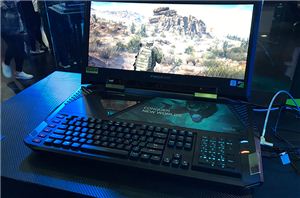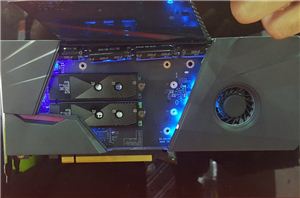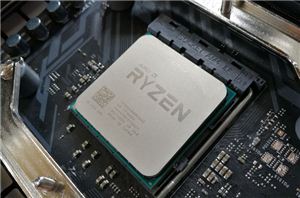A Rose By Any Other PR Name: Lian Li’s Strimer, or is it Streamer?
by Ian Cutress on June 19, 2018 11:00 AM EST- Posted in
- PSUs
- Lian Li
- Trade Shows
- RGB
- Computex 2018
- Lian Li Strimer
- RGB LED
- Cables

Part of our early Computex coverage involved Lian Li’s new RGB product, the Strimer, which integrates RGB strips along a 24-pin ATX cable. The idea here was that out of all the components in a PC that have not been equipped with the RGB virus, this was one of the last ones. We received the press release and information, wrote a news post, but it was not until the end of the week when we got a chance to visit the Lian Li booth to see it in person. It was an interesting meeting, but for the wrong reasons.
Within a few minutes of arriving, saying hello, and sitting down to catch my breath after having six meetings back to back, the representative at the booth, a member of the PR agency that Lian Li uses to interact with western media, asked if I wanted to see the new ‘Streamer’. I looked confused for a couple of seconds, as the whole booth was labelled with signs saying ‘Strimer’, and then it clicked. No-one at Lian Li or their PR company had considered asking a native English speaker how ‘Strimer’ would be pronounced.
Since that meeting, I have discussed with a few other journalists who have confirmed my thoughts. I explained to the PR person the thought process about naming a product like this, as ‘Strimer’ is naturally pronounced very differently for a native English speaker.
I explained that the first four letters, ‘Stri’, is usually indicative of a word such as Stripe. Very rarely in English do we see the letters STRIM together, more often it comes across as TRIM or STRIPE. As a result, given that we had only read the word, we had been pronouncing it internally as Stri-mer. It took the best part of 10 minutes to explain why a native English speaker would think this way, and we were honestly shocked that the name had not been road tested before – no-one in the PR company was a native English speaker, after all. I did say to my contacts that if they ever wanted to run a future product name to me, as a sanity check, then my email is open.
Strimer, Streamer, what’s in a name? It might not mean much, but this is one of the minor esoteric things that sometimes happens in our industry. It creates an amusing anecdote to us, but I wonder what effect this discovery might have to the company in question.
| Want to keep up to date with all of our Computex 2018 Coverage? | ||||||
 Laptops |
 Hardware |
 Chips |
||||
| Follow AnandTech's breaking news here! | ||||||
















7 Comments
View All Comments
drexnx - Tuesday, June 19, 2018 - link
It'll always be the stri-mer to me, no way I can read that as "streamer"Honestly, given some of the other bizarre names tech has generated, I can take Strimer at face value
(i.e. strix, aorus, SUPER LUCE, ROG, etc.)
versesuvius - Tuesday, June 19, 2018 - link
Maybe the industry is moving toward 1 nm chips faster than it should?Ej24 - Tuesday, June 19, 2018 - link
It's not super intuitive to English speakers. But having learned mandarin during college it makes more sense from that perspective. In Chinese pinyin, phonetically, i, makes more or less only two sounds, the short i as in: ingress, it, shift, hit. So in Chinese its: ping, ting, shi. Or it can be a long i that's more common in Spanish where it sounds like "ee" a long e. In Chinese that's used in: yi, di, ni. So I can see how they arrived at strimer being like streamer, assuming they're familiar with pinyin.Kind of reminds me of "Liqtech" or "liqfusion" by Enermax. Awkward name but a decent product so people don't really care. We'll see how this turns out.
londedoganet - Tuesday, June 19, 2018 - link
It’s a bad name in any case because when I see “Strimer”, I think “strimmer”, i.e. a “weed-whacker”, a lawn-care tool that uses a nylon filament (“string”) to trim foliage.stephenbrooks - Wednesday, July 11, 2018 - link
I pronounce it as in "More reliable than a garden strimmer"